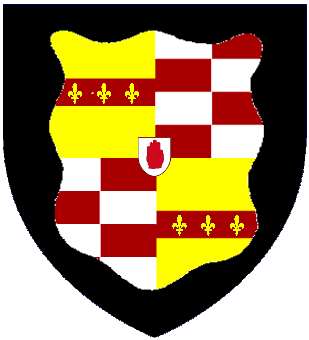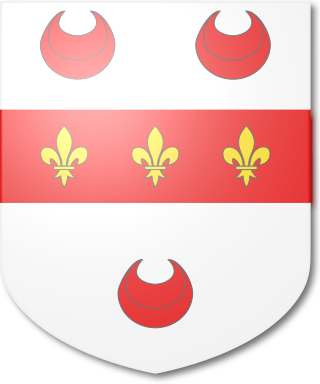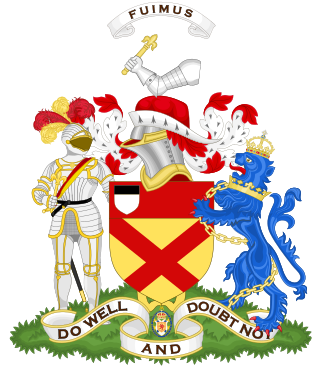
Viscount Hardinge, of Lahore and of Kings Newton in the County of Derby, is a title in the Peerage of the United Kingdom. It was created in 1846 for the soldier and Tory politician Sir Henry Hardinge. His son, the second Viscount, represented Downpatrick in Parliament. His great-great-grandson, the sixth Viscount, succeeded a distant relative as eighth Baronet, of Belle Isle in the County of Fermanagh, in 1986. This title had been created in the Baronetage of the United Kingdom 1801 for Richard Hardinge. He was the third son of Nicolas Hardinge, younger brother of Reverend Henry Hardinge and uncle of the latter's third son Henry Hardinge, 1st Viscount Hardinge. The baronetcy was created with special remainder to the heirs male of Richard Hardinge's father.
The Stronge baronetcy of Tynan was conferred in the Baronetage of the United Kingdom on 22 June 1803. The family were northern Irish landowners of Tynan Abbey, County Armagh, also possessing the residence of Lizard Manor, Aghadowey, County Londonderry.
The Duff, later Duff Gordon Baronetcy, of Halkin in the County of Aberdeen, is a title in the Baronetage of the United Kingdom. It was created on 12 November 1813 for James Duff, British Consul in Cádiz, with remainder to his nephew, William Gordon.
There have been two baronetcies created for persons with the surname Aykroyd, both in the Baronetage of the United Kingdom for members of the same family.

The Barrett-Lennard Baronetcy, of Belhus in the County of Essex, is a title in the Baronetage of the United Kingdom. It was created on 30 June 1801 for Thomas Barrett-Lennard, subsequently Member of Parliament for Essex South. He was the illegitimate son and testamentary heir of Thomas Barrett-Lennard, 17th Baron Dacre. He was succeeded by his grandson, the second Baronet, the son of Thomas Barrett-Lennard, Member of Parliament for Maldon. His son, the third Baronet, was childless and was succeeded by his younger brother, the fourth Baronet. This line of the family failed on the death in 1977 of his son, the fifth Baronet, who died without male issue. The late Baronet was succeeded by his third cousin once removed, the sixth Baronet. He was the son of Sir Fiennes Cecil Arthur Barrett-Lennard, Chief Justice of Jamaica, son of Captain Thomas George Barrett-Lennard, son of the first marriage of George Barrett-Lennard, son of John Barrett-Lennard, second son of the first Baronet. The sixth Baronet was a Catholic clergyman. As of 2014 the title is held by his second cousin, the seventh Baronet, who succeeded in 2007. He is the grandson of Trenchard Barrett-Lennard, son of the aforementioned George Lennard-Barrett by his second marriage. As of 31 December 2013 the present Baronet has not successfully proven his succession and is therefore not on the Official Roll of the Baronetage, with the baronetcy considered vacant since 2007.
Sir Nigel Gresley Ball, 3rd Baronet was Professor of Botany at Ceylon University College, Sri Lanka, (1924-1943).
There have been four baronetcies created for persons with the surname Bell, all in the Baronetage of the United Kingdom. One creation is extant as of 2007.

The Baynes Baronetcy, of Harefield Place in the County of Middlesex, is a title in the Baronetage of the United Kingdom. It was created on 29 June 1801 for Christopher Baynes. He was Major-Commandant of the Uxbridge Gentlemen and Yeomanry Cavalry, which he helped to raise. The title descended from father to son until the death of his great-great-grandson, the fifth Baronet, in 1971. The late Baronet died unmarried and was succeeded by his first cousin, the sixth Baronet. He was the son of Reverend Malcolm Charles Baynes, fourth son of the third Baronet. As of 2023 the title is held by his grandson, the eighth Baronet, who succeeded his father in 2005.
The Huntington-Whiteley Baronetcy, of Grimley in the County of Worcester, is a title in the Baronetage of the United Kingdom. It was created on 8 February 1918 for Herbert Huntington-Whiteley, Conservative Member of Parliament for Droitwich.

The Oakeley Baronetcy, of Shrewsbury, is a title in the Baronetage of Great Britain. It was created on 5 June 1790 for the Indian administrator Charles Oakeley. He served as Governor of Madras from 1790 to 1794. Frederick Oakeley was the second son of the first Baronet.
The Stamer Baronetcy, of Beauchamp, Dublin, is a title in the Baronetage of the United Kingdom. It was created on 15 December 1809 for William Stamer, who was Lord Mayor of Dublin in 1809 and 1819.

The Baronetcy of Gresley of Drakelow was created in the Baronetage of England on 29 June 1611 for George Gresley of Drakelow Hall, Derbyshire who was later High Sheriff of Derbyshire and Member of Parliament for Newcastle-under-Lyme.

The Buckworth, later Buckworth-Herne, later Buckworth-Herne-Soame Baronetcy, of Sheen in the County of Surrey, is a title in the Baronetage of England. It was created on 1 April 1697 for John Buckworth, High Sheriff of London in 1704. The second Baronet sat as Member of Parliament for Weobley. The third Baronet was Assistant Gentleman Usher to George II. The fifth Baronet was Gentleman-Pensioner and Exon of the Guard during the reign of George III. He married Anne, daughter of Paston Herne, of Haveringland Hall, Norfolk, and assumed by Royal licence the additional surname of Herne. The sixth Baronet assumed in 1806 by Royal licence the additional surname of Soame in compliance with the will of Sir Peter Soame, 4th Baronet, of Thurlow. The ninth Baronet was a member of the Shropshire County Council.

Sir Charles Bent Ball, 1st Baronet, Hon FRCS MD FRCSI was an Irish surgeon and an honorary surgeon to the King in Ireland.
The Sullivan baronetcy, of Thames Ditton in the County of Surrey, was created in the Baronetage of the United Kingdom on 22 May 1804 for the writer and MP Richard Sullivan. The third and sixth Baronets were Admirals in the Royal Navy. The ninth holder of the baronetcy did not use his title; as of 2023 the Official Roll marked the baronetcy as vacant.

The Bruce Baronetcy, of Stenhouse in the County of Clackmannan, was created in the Baronetage of Nova Scotia on 29 September 1628 for William Bruce, with remainder to his heirs male whatsoever. He was a descendant of Sir Robert Bruce of Clackmannan, who was also the ancestor of the ancestor of the Earls of Elgin. The eleventh Baronet was an author and adventurer.

The Lees Baronetcy, of Blackrock in the County of Dublin, was created in the Baronetage of the United Kingdom on 30 June 1804 for the soldier and politician John Lees.
The Fraser Baronetcy, of Tain in the County of Ross, was created in the Baronetage of the United Kingdom on 12 July 1943 for John Fraser. He was Regius Professor of Clinical Surgery at the University of Edinburgh and Honorary Surgeon to His Majesty the King in Scotland. As of 2024, the title is held by his great-grandson, the fourth Baronet, who succeeded his father in 2019.

The Baird baronetcy of Newbyth, second creation, in the County of Haddington, was created in the Baronetage of the United Kingdom on 13 April 1809 for the soldier David Baird, grandson of William Baird, a younger son of Sir Robert Baird, 1st Baronet, of Saughtonhall. His father, William Baird, had inherited the Newbyth estate in 1745 on the death of Sir John Baird, 2nd Baronet, of the 1680 creation. The baronetcy was created with remainder to Baird's elder brother Robert Baird and the heirs male of his body. Sir David Baird died childless and was succeeded, according to the special remainder by his nephew David Baird, the second Baronet. At the death of the 6th Baronet in 2022, his fourth cousin, Sir Andrew James Baird became the 7th Baronet in April 2023.

The Shaw baronetcy, of Bushy Park in the County of Dublin, was created in the Baronetage of the United Kingdom on 17 August 1821 for the Tory politician Robert Shaw. The 3rd Baronet was also a politician.











